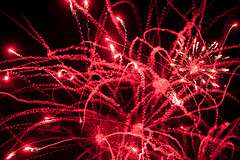Professionals launched 15,771 fireworks at The Central PA 4th Fest on July 4, 2010, at Penn State's University Park campus. Credit: Andy Colwell
The Fourth of July is a time for celebration across the country and fireworks are a crowd favorite each year. While fireworks can be fun to watch, they also can be very dangerous.
In 2009, an estimated 3,432 children ages 15 and under had injuries involving fireworks, with most of these injuries occurring between the middle of June and the middle of July. Children and teenagers are the most likely people to be injured as a result of consumer fireworks. According to the U.S. Consumer Product Safety Commission, approximately 40 percent of the people injured by fireworks were under the age of 15.
Don’t ever let kids play with fireworks or sparklers. Fireworks, including sparklers and flares, can cause serious burns as well as blast injuries that can permanently impair vision and hearing. Teach your children what to do if their clothing catches on fire — ‘stop, drop and roll’ — and how to call 911 in an emergency. However, the safest way to enjoy fireworks is to watch them at a community event where professionals handle them.
The following are safety tips for sparklers and fireworks from the National Council on Fireworks Safety:
-- Children under 12 years of age should not use sparklers. Sparklers can reach 2,000° Fahrenheit -- hot enough to melt some metals.
-- Do not allow kids to pick up pieces of fireworks after an event. Some may still be ignited and can explode at any time.
-- Never hold a child in your arms while using sparklers as they may grab for them.
-- Sparklers and bare feet don’t mix. Always make sure that everyone has close-toed shoes.
-- The sparkler wire remains hot after the flame has gone out. Drop it into a bucket of water.
-- Always stand at least 6 feet from another person with a sparkler to prevent eye injuries or burns.
-- Teach older children to not wave the sparklers or run when holding them.
There are many fireworks that are illegal and checking with your local police department can help avoid issues but most of all prevent fires or other safety hazards. Where permitted by law, fireworks should be handled and used in strict accordance with the manufacturer’s instructions and all warning labels.
We recommend these precautions for adults using fireworks:
-- Light fireworks only on smooth, flat surfaces, and aim them away from buildings, dry leaves, flammable materials and spectators.
-- Do not try to relight fireworks that malfunction.
-- Do not carry fireworks in your pocket or hold them close to your face.
-- Visit www.recalls.gov to make sure the pyrotechnic devices you are using are not subject to any safety recalls. Do not modify fireworks or use homemade fireworks.
-- Keep a phone handy, and know first aid for burns. Also, keep a fire extinguisher handy and know how to use it.
More information: For more information about fireworks safety and burn prevention, visit www.fireworksafety.com
Provided by Pennsylvania State University





















